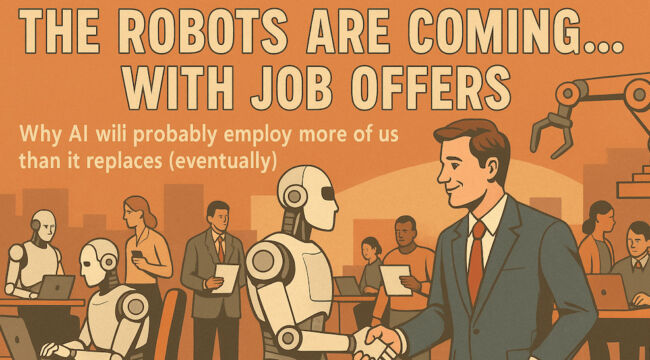The Robots Are Coming… With Job Offers
Let’s play a little game of economic whack-a-mole.
Every time someone yells, “AI is going to take all our jobs!” someone else pops up and calmly says, “Yes, but it’ll create even more!”
And they’re both right… sort of.
Welcome to the world of artificial intelligence, where your job might disappear, but a better one might pop up before you hit the unemployment line. That is, assuming you can reskill, relocate, and reinvent yourself faster than ChatGPT can crank out cover letters.
The Industrial Revolution, Now in Beta
Every time we face a technological shift, the Chicken Littles start squawking. And to be fair, sometimes the sky does fall — at least on certain sectors and workers.
But let’s zoom out.
The Industrial Revolution wiped out cottage textile work but gave rise to the modern factory. The automobile killed the horse-drawn carriage business, but it also created Detroit (for better or worse). And the digital revolution may have killed your local bookstore, but it has also given us Amazon, remote work, and the ability to doomscroll at 2 a.m.
Historically, tech has a solid track record: it destroys, but it also creates, often more than it eliminates.
So what about AI?
Spoiler: The Math Favors Job Creation
The World Economic Forum predicts AI will create 133 million jobs by 2025, while displacing 75 million. That’s a net gain of 58 million jobs — nearly the population of Italy.
McKinsey projects that by 2030, AI will generate between 20 million and 50 million new jobs, particularly in healthcare, manufacturing, and finance.
We’re talking about roles in AI development, data science, human-machine teaming, ethics oversight, and a new class of specialists who can train, audit, and deploy AI systems responsibly.
Hell, even prompt engineering — a job category that didn’t exist 24 months ago — is now pulling six figures in Silicon Valley.
AI is also fueling firm growth and productivity. Companies that integrate it wisely tend to hire more employees, innovate faster, and expand into new markets. It’s like hiring an army of unpaid interns who don’t sleep (and don’t unionize… yet).
But Yes, the Guillotine Still Swings
This isn’t a utopian puff piece. AI’s blade is very sharp and already swinging.
If your job involves repetition, routine, or redundant reports, your days may be numbered. That’s not a scare tactic — it’s a trend line.
Customer service, clerical work, middle management, and basic data entry are all at risk. Experts warn that up to 50% of entry-level white-collar jobs may vanish in some sectors within five years.
Manufacturing and retail are bracing for more pain, especially in regions that haven’t yet recovered from the last round of globalization.
Since 1980, automation has been a net job-killer in the U.S. economy, with more jobs lost than created, according to MIT. And unlike the assembly line, AI doesn’t need a lunch break.
It’s Not Just About Jobs. It’s About the Right Jobs
One of AI’s most insidious effects isn’t that it eliminates work — it transforms it.
This “job transformation” means more roles will require higher education, digital literacy, and technical acumen. You may still have a job, but now you’ll need to know Python, or at least how to ask ChatGPT the right questions.
And here’s where it gets uncomfortable: not everyone can or will make the jump.
Blue-collar workers were told to “learn to code.” Now, coders are being told to “learn to prompt.” Next up? “Learn to philosophize about machine ethics while managing a hybrid team of bots and freelancers in three time zones.”
Not exactly a smooth transition for a 53-year-old warehouse worker in Topeka.
Location, Location, Location!
The AI revolution isn’t just picking winners and losers by profession. It’s picking them by location.
Tech hubs will thrive. Rural areas and declining industrial zones? Not so much.
Nations that invest in retraining and education will win. Those that don’t will face higher unemployment, slower growth, and a lot more populist anger.
The Real Bottleneck Isn’t the Robots. It’s Us.
Let’s be blunt: the job market isn’t a vending machine. You can’t just lose one job and expect a new one to drop out of the chute.
Retraining is hard. Relocating is expensive. Reskilling at scale? Even harder.
Without serious policy support, corporate strategy, and individual adaptability, AI will leave many people behind. Fast.
We will need vouchers for retraining, tax incentives for upskilling, public-private partnerships focused on digital literacy, and temporary unemployment benefits as a safety net. (I won’t call for universal basic income… ever.)
So… Will AI Create More Jobs Than It Destroys?
Probably. But that’s not the whole story.
Yes, the total number of jobs could increase.
Yes, some people will thrive.
But millions will suffer during the transition.
Just like every tech revolution, the aggregate looks better than the anecdote. But the anecdotes are where the real pain lives.
Think of it like this:
“The average person in a room with Jeff Bezos is a billionaire.” But the “average person” still broke.
The same goes for the job numbers.
Wrap Up
AI would’ve been Joseph Schumpeter’s favorite innovation ever: the ultimate creative destroyer. It’s going to wipe out bad jobs, boring jobs, and brain-dead bureaucratic work.
But it’s also going to reward the curious, the adaptable, the entrepreneurial, and yes, those willing to get uncomfortable.
So don’t fear the robots. Fear stagnation.
And master discomfort.
If you stay still, AI will pass you by. However, if you adapt to it, learn from it, and use it as a tool rather than a threat, you may find yourself on the winning side of the ledger.
Because in the end, AI doesn’t steal your job — your inability to evolve does.
And evolution favors the fast.



Comments: